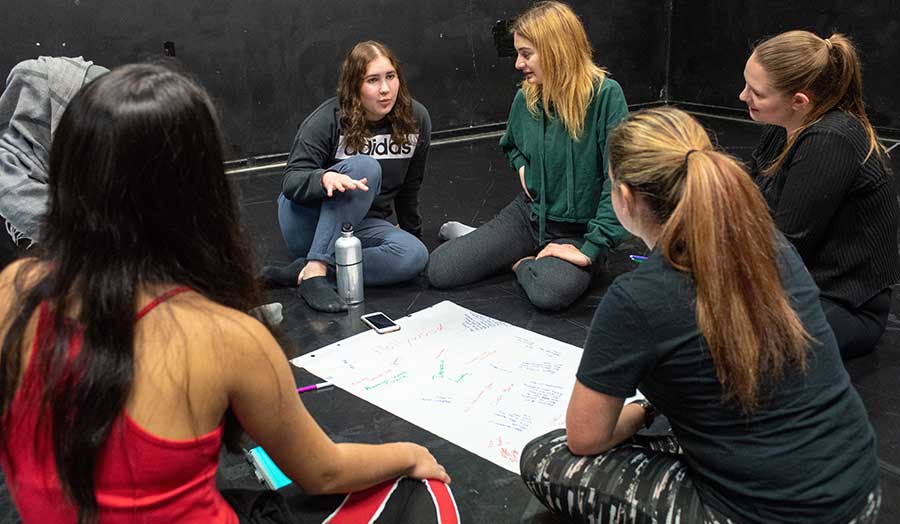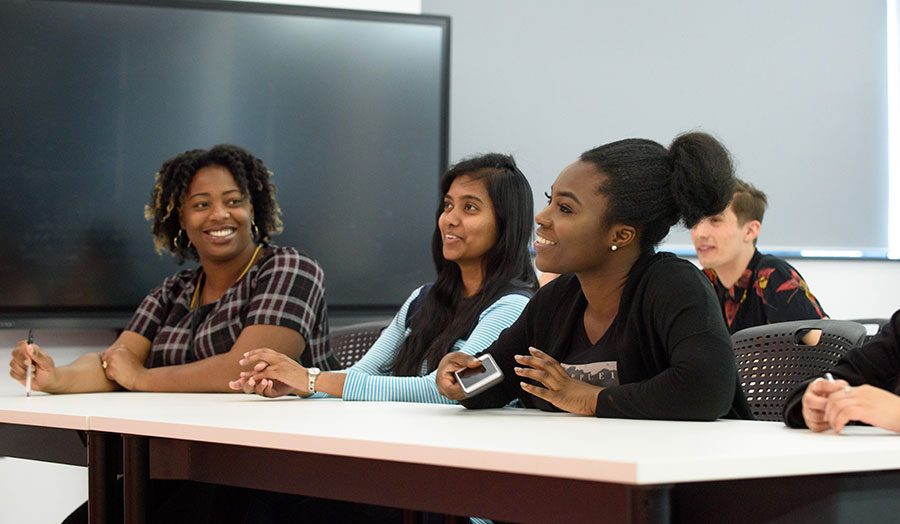

What to Include in Your PGCE Personal Statement
How your pgce personal statement should be structured, example personal statement, final thoughts, pgce personal statement.
Updated November 24, 2021

A PGCE personal statement is written as part of the application process for teacher training and gives candidates an opportunity to showcase their skills and attributes.
PGCE candidates will only write one personal statement, which is used to apply for all of their preferred choices. Students upload their personal statement to the UCAS Teacher Training system, and it is submitted for all choices in both phases of the application process (‘Apply 1’ and ‘Apply 2’). No changes can be made once it is submitted.
The personal statement is often used as the deciding factor for choosing whom to invite to interview . This piece of writing should explain the experience you have and how this translates into your abilities in the classroom.
It should also present what you might be like as a teacher – how will your personality and interests help engage students and get them enthused about the subject?
A lot is riding on your personal statement and writing it can be a daunting task. This guide will outline what your PGCE personal statement should contain and how to structure it for the best chance of success.
The admissions team will want to know about the skills, experience and personal qualities you have that would make you perfect for a teaching career. They need to see you have the dedication and passion to complete your PGCE and have a successful future.
Simply saying, “I would be good at this role and am well suited to it” isn’t enough. The PGCE provider needs to read real examples that demonstrate your skills and abilities and meet their requirements.

Here are some details you may want to include in your personal statement:
1. About You
A teacher’s personality and personal experience will be highly influential, therefore your own experiences are relevant to your application.
Before you start writing, it’s a good idea to spend a few minutes jotting down some key facts that are relevant to teaching. These might include:
- Your interests
- Qualifications/achievements
- What motivates you
- Your upbringing
- Relevant skills
Remember to include examples in your list. Coaching a sports team in your spare time suggests you are experienced in motivating young people and getting the best out of them. Maybe you play an instrument and use music in class. Including qualities like these will make your application stand out.
2. Why You Want to Teach
A key element of your application is explaining why you have chosen teaching as your future career. Show an awareness of how teachers can inspire individuals and also the benefits you might see in yourself.
Try to broaden your answer further than simply saying you are passionate about teaching or children. Every applicant will say they are passionate.
Give details of experiences that moved you towards this career or, perhaps, even the moment you realised this was what you were born to do. By using genuine examples, your passion and excitement will shine through.
3. Why You Are the Best Candidate
Try not to pull out a cliché like “I am passionate, dedicated and reliable” – make your application stand out by using a paragraph that the provider won’t see in any other application that day.
Think about what makes you different from any other candidate. Other applicants may say they can take charge of a class and have experience dealing with challenging children, but will they sing an entire lesson just to get the pupils to engage with them, like you did in your work experience? Or will they bring in a structure made out of Lego to demonstrate osmosis, like you did on your degree placement? Think of what makes you, you.
4. Why a PGCE?
Include details of why you have chosen to go down the route of a PGCE rather than doing a full teaching degree. Perhaps you dipped your toe into teaching while travelling after your degree and realised how much you love it, or maybe you are passionate about biology and wanted to decide at a later date whether to go into teaching or industry.
Show that you have done your research and understand the structure of the PGCE and what will be required.
5. Teaching-Related Experience
Include details of any experience you have gained working in schools or with children in another environment. This might include:
- Work experience
- Visits to schools
- Teaching assistant roles
- Voluntary teaching/supervision roles (like helping out at a scout hut, etc.)
- Experience via the Get School Experience service
- Classroom observations
With every experience you discuss, note the skills you gained and how they will benefit you as a teacher and how they have improved your understanding of the education system.
6. Other Professional Experience
Teaching demands a range of different skills – it’s not simply a case of delivering information.
Talk about past positions you have held:
- Did you manage people?
- Did you work within a team?
- Did you negotiate?
- Have you trained or coached others?
- When have you communicated information to different audiences?
The skills you have gained throughout your education, work and personal life can be highly relevant to your application. Be sure to include details of why these skills will make you excel as a teacher.
7. What You Learnt During Your Degree
Whether your degree was in the subject you intend to teach or not, it’s important to talk about the skills you developed throughout your learning and how they will benefit you as a teacher.
If you’re struggling to find transferable skills , here are some ideas:
- Think about how you communicated (presentations, critiquing the work of your peers, etc.)
- Give examples of how you organised yourself
- Describe times you helped others with their learning
Remember to talk about the benefits your initial degree will bring when studying for your PGCE and how your interest in it has inspired your desire to teach.
8. Your Knowledge of What Training to Be/Being a Teacher Entails
It’s important to stress your commitment to your training. To do this, you should demonstrate that you have done your research and are fully aware of what is to come.
Although teaching is a highly rewarding career, no one applying for teacher training will do so without being aware of the challenging nature of the profession.
There is no need to ignore these challenges in your application; actually, it will work in your favour if you show that you have thought about these challenges and are sufficiently prepared.
Talk about the positives and negatives that you expect to experience in your training and within your career, and how your core strengths will help you deal with them.
9. Your Future Plans
Discuss your plans beyond the PGCE:
- Do you have the ambition to be a headteacher?
- Do you plan to take on pastoral responsibilities?
Show a keenness to immerse yourself in the school system and be open to opportunities that come your way.
10. Extenuating Circumstances
Your personal statement is the place to openly discuss any extenuating circumstances, such as low grades or large gaps in employment/education. Make sure you show how you have overcome these challenges and what you learnt from them.

Write your personal statement in Word (or equivalent) and make sure you are happy with it before copying and pasting it into your application on the UCAS system.
You need to keep your personal statement to no more than 4,000 characters across a maximum of 47 lines of text . The UCAS Teacher Training system may differ slightly to your word processor, so be prepared to amend slightly once you have copied it into the UCAS page.
To keep to the character limit and cover all the suggested material above, you will need to be succinct. Make sure you only talk about topics that are relevant and delete any waffle.
Your opening statement should be strong and memorable – a good idea is to state why you have decided to get into teaching. Back up all details with examples and be sure to say what you learned from the experience or how you can bring the skills you developed into the classroom.
Split your statement into three sections:
- Introduction – Introduce yourself and talk about why you want to do a PGCE
- Middle – Use the notes above to cover the key details
- Conclusion – Tell the reader why you are the best person for the place they are offering
Avoid using bold, underlining or italics, and write in English (or Welsh if applying for Welsh PGCEs). The UCAS system will strip all special formatting out of the personal statement (except paragraph breaks) so ensure you keep it simple.
When you are happy with the content, make sure you ask someone to check your work . Spelling and grammar in personal statements should be accurate. Make sure you have not copied anyone else’s work at all – UCAS screens all applications for plagiarism.
Below is an example personal statement which covers all of the key points you should include in this piece of writing:
A teacher at my secondary school single-handedly transformed my passion and ability for maths; I was predicted an ‘F’ at GCSE and in a matter of months, she helped me achieve a ‘B’ and start to enjoy the subject. I can’t think of a more satisfying job than one in which you can inspire young people in the way my teacher inspired me. After achieving a ‘B’ in maths at A-Level, I went on to study the subject at University College London and graduated in 2018 with a 2.1. It was in the final year of my degree that I had my first taste of teaching the subject, as several of the modules involved presenting topics to large groups of first-year students. I was thrilled when students asked to see me afterwards to share their observations of what I had been discussing – it was clear my enthusiasm had rubbed off on them and they were excited by maths, which is exactly why I want to teach. I currently work as a teaching assistant at St Andrew’s School, where I have been for six months. This position has given me a great insight into the skills needed to be a fantastic teacher; the school has several SEN pupils and I have been exposed to the more challenging side of the profession. Being trusted to run activities with the entire class has helped me build confidence and learn how important it is to adapt lesson plans to engage students who have different abilities. I have gained valuable skills in implementing strategies such as gentle competitiveness between pupils, and tactical seating plans to get the best out of each student. Before working at St Andrew’s, I completed a work experience placement at Bell Lane Academy where I shadowed teachers working across the five different year groups. This experience helped hone my skills in addressing different age groups in different ways. My ability to get the best out of students is further strengthened by the experience I am currently gaining in the position of assistant coach at my local netball team. Having worked with the girls for the last 18 months, I have developed different ways of motivating individuals, helping push them outside of their comfort zones and encouraging them to take on new challenges. In my spare time, I enjoy playing netball and rugby and would be keen to take on extra responsibilities at a school in the form of after school clubs or teams. I also have a keen interest in management styles and personality types. The knowledge I gain from books on these topics helps me understand pupils and their differing learning styles – what works for them and what doesn’t. It also helps me look inwardly, analysing my own leadership style and methods of teaching. I have chosen to do a PGCE because I am passionate about maths, and I wanted to spend three years of a degree course exploring the subject further, rather than embarking on teacher training straight from school. My degree course has helped me with my confidence and my ability to speak in front of large groups of people. Teaching first-year students during my degree course helped me think about how to deliver the subject in an exciting and creative way. The experience I have had so far has clearly shown that teaching is an extremely challenging profession, but one which I believe is undeniably my calling in life. I adore maths and I want to bring the subject alive, helping children learn in an exciting, rewarding environment. A few weeks ago, I took it upon myself to ask the headteacher for permission to get the whole year group involved in a human percentages exercise – the children loved it. I believe I should be offered a place on your PGCE programme because I can commit to dedicating myself to a role in which I will strive to inspire and excite every pupil I teach.
The personal statement is your one opportunity to capture the attention of the PGCE provider and set yourself apart from other candidates. Teaching is about bringing your personality into the classroom and inspiring students, so avoid a formulaic application and speak from the heart, giving a full picture of who you are.
Your answers should convey enthusiasm for inspiring young people, a passion for teaching, creativity, excellent organisational skills and energy.
Demonstrate an awareness of this challenging profession but conclude with excitement and enthusiasm for your chosen career path.
You might also be interested in these other Wikijob articles:

Or explore the Postgraduate / Further Study sections.
Suggestions in Courses
Suggestions in news.
- No suggestions found.
Suggestions in Events
Writing a pgce personal statement.
If you’re applying to train as a teacher you’ll be required to write a personal statement as part of your application.
Take your time writing your personal statement. It’s your first chance to make a good impression so it's well worth investing time to develop a clear structure and style of writing.
It’s a good idea to proofread your statement thoroughly and get others to read through and check for typos, grammatical errors, style, and tone.
What's the personal statement for?
The personal statement is crucial to your PGCE application; it is used primarily to decide whether to invite you for an interview. A poorly written personal statement could end your teaching career before it has started!
This is your chance to demonstrate what you have to offer as a teacher. You should also explain why you want to teach a particular subject or age range, and how your skills and experience will help you become a great teacher. It’s your chance to show your motivation, commitment and teaching potential and an opportunity to show your enthusiasm for teaching a particular subject or age group.
Remember, you only get one opportunity to write a personal statement for both cycles of applications, so it’s important to keep in mind that you should avoid creating tailored personal statements for each university.
How to write and structure your personal statement
The personal statement is split into two sections totalling a maximum of 1,000 words. It’s important to make sure you do not repeat yourself and to take time to ensure that each section is organised coherently. Divide your writing into paragraphs, each dealing with a particular aspect of the question.
Section 1: Why do you want to teach?
(Up to 600 words).
This is the place to talk about why you think you would make a great teacher. You can include:
- what has led you to choose teacher training
- your understanding of the demands and rewards of the PGCE course and of the teaching profession
- the personal qualities that will make you a valuable asset to a school
- details of any paid or unpaid experience you have of working with young people and what you learnt
- details of any other experiences which you can bring to the teaching profession. Think about any ‘transferable skills’ or qualities which you have developed which may be relevant to teaching.
- If you are a career-changer, what have you been doing and what are your reasons for the switch to teaching?
- your thoughts on children’s wellbeing and the education system
Your personal statement should tell us why you want to teach, your skills and about any experience you might have of working with young people or in the education sector. If you are taking any exams or additional study before starting the course, particularly if this relates to your eligibility to join the course, we want to hear about it.
It should also show that you understand the education system, what challenges teachers face and that you’re engaged with issues around education.
If you’ve not taught before, think about any other things you’ve done that might demonstrate the skills you’ll need to be a teacher (your transferable skills).
Although it’s a good place to expand on your skills and experience, this shouldn’t be the main focus of your personal statement as the rest of the application will showcase this.
Section 2: Why are you suited to teach your subjects or age group?
Up to 400 words.
Remember to not repeat anything you have already said in section 1!
If you’re writing a personal statement for secondary teacher training, use this section to describe your knowledge and experience of the subjects you’ve chosen. Any work experience in the field will be of interest.
What universities are looking for
Universities want to see your passion for teaching and understand why you think teaching this subject or age group is the right career for you.
Your personal statement should be original and honest. Try and avoid clichés or writing what you think we want to hear. All we really want to hear are the real reasons you’re applying to study a PGCE and become a teacher.
If you’re writing a personal statement for primary teacher training, say why you’d like to teach this age group. If you are particularly interested in certain primary subjects or have relevant experience in them, you can talk about that here too.
You could talk about:
- any relevant work or unpaid experience
- your degree and degree modules
- your other relevant qualifications, such as A levels
- any relevant skills, interests or achievements
- your understanding of the national curriculum
Questions your personal statement should answer
- Why do you want to be a teacher?
- Why do you want to teach a particular subject, Key Stage or age group?
- What are your strengths?
- What experience do you have and how has this influenced your desire to teach?
- What skills do you have that would be useful for teaching
The finer details
Your personal statement should be:
- no more than 1000 words
- written in the first-person
- grammatically correct - we suggest writing in a document before adding to your application
- your own work, don’t copy from anywhere online
- structured correctly with a clear introduction, evidenced paragraphs and a conclusion
- proof-read before being submitted
And finally, be prepared to answer questions about what you’ve written in your personal statement at the interview stage!
Find out more about how to get into teaching .
.jpg)
Find out more about how to get into teaching .
Follow us on social!
Facebook Instagram LinkedIn Twitter YouTube
Study a PGCE at London Met

PGCE Primary (3-7) - PGCE
Study this PGCE Primary course and become a qualified teacher of three to seven-year-olds.

PGCE Primary (5-11) - PGCE
Train to teach five to 11-year-olds on this PGCE course that leads to Qualified Teacher Status (QTS).

PGCE Secondary Computer Science with ICT - PGCE
Train to teach Computer Science with ICT to 11 to 16-year-olds and, by arrangement, 16 to 18-year-olds.

PGCE Secondary Computer Science with Maths - PGCE
This London Met Computer Science with Mathematics PGCE is a great option for those who want to combine both disciplines into their PGCE. Apply now.

PGCE Secondary English with Drama - PGCE
This course will train you to teach English and Drama to 11 to 16-year-olds and, by arrangement, 16 to 18-year-olds.

PGCE Secondary English with Media - PGCE
Train to teach English and media to 11 to 16-year-olds and, by arrangement, 16 to 18-year-olds.

PGCE Secondary Mathematics - PGCE
Train to teach maths to 11 to 16-year-olds and, by arrangement, 16 to 18-year-olds. This course leads to Qualified Teacher Status (QTS).

PGCE Secondary Modern Languages - PGCE
Train to teach modern languages to 11 to 16-year-olds and, by arrangement, 16 to 18-year-olds with our PGCE course that leads to Qualified Teacher Status (QTS).

PGCE Secondary Science with Biology - PGCE
Train to teach science and biology to 11 to 16-year-olds and, by arrangement, 16 to 18-year-olds on this PGCE course that leads to Qualified Teacher Status (QTS).
PGCE Secondary Science with Chemistry - PGCE
Train to teach science and chemistry to 11 to 16-year-olds and, by arrangement, 16 to 18-year-olds. This PGCE course leads to Qualified Teacher Status (QTS).

PGCE Secondary Science with Physics - PGCE
Train to teach science and physics to 11 to 16-year-olds and, by arrangement, 16 to 18-year-olds on our PGCE course that leads to Qualified Teacher Status (QTS).
-(1).jpg)
Primary (7-11) (Key Stage 2) - PGCE
Train to teach seven to 11-year-olds on our specialist Key Stage 2 course, with Qualified Teacher Status (QTS).
More articles like this...
Checking your eligibility to study a pgce, how to prepare for your teacher training application, how to write a good personal statement for pgce application, what to expect at your pgce interview.
- Log in
- Site search
Teaching personal statement examples
Giving you the chance to show why you'd be a great teacher, your personal statement is an important part of your application and worth taking the time over
What is a teaching personal statement?
Your personal statement is used to explain why you want to become a teacher and your suitability for the role. While your application form briefly outlines your qualifications, skills and work experience, your teaching personal statement is where your personality shines through.
Take your time with it. Many candidates often spend a few weeks on this part of the application as you don't have to write it all at once. You should get someone to read over it and be prepared to receive constructive feedback and write a few drafts before you send it off.
It's important to:
- use examples based on your recent teaching experience
- tailor your personal statement according to the school/age group
- use good, clear, written English, using first person terms such as 'my' and 'I'
- be original and honest
- avoid clichés and general statements, such as 'I've always wanted to teach'
- demonstrate a passion for teaching.
While it's crucial to get it right, your teaching personal statement is only a small part of the application process. Find out how else you'll need to prepare to get a teaching job .
How to write a personal statement for teaching
Your personal statement should be between 500 and 1,000 words. It's crucial that you don't copy and that the statement you provide is your own work .
This is your opportunity to:
- write about any relevant skills and experience you have
- explain your understanding of why teaching is important
- detail why you want to become a teacher
- list any extra skills or experience you have, such as volunteering or first aid.
See personal statements for postgraduate applications for more guidance.
The nature of your personal statement will vary, depending on the type of teaching you'd like to pursue. Take a look at some of our example personal statements to get an idea of how they differ.
Personal statement for PGCE primary
As well as focusing on roles in which you've gained experience with primary-age children, a PGCE primary personal statement should demonstrate your well-rounded personality and any skills that could be useful for the range of extra-curricular activities primary schools provide (such as the ability to read music for recorder lessons, or drama experience to help with school plays).
Personal statement for PGCE secondary
Many good PGCE secondary personal statements acknowledge the challenges involved in teaching older pupils and provide examples of where the candidate has worked to overcome these problems. As secondary teaching roles are geared towards teaching a specific subject, training providers are looking for more evidence of your subject and degree knowledge.
Personal statement for School Direct
If you're applying for the salaried School Direct route, you should discuss the experience you've gained in the classroom prior to your application. One of your references will need to be from an employer, or someone who can comment on your work ethic and suitability for teaching. Don't worry if your degree is unrelated to the subject you'd like to teach - you may still be able to apply by completing a subject knowledge enhancement (SKE) course .
Find out more
- Discover how to structure a teaching CV .
- Find out what it's really like to be a primary or secondary school teacher .
- Search postgraduate courses in teaching .
How would you rate this page?
On a scale where 1 is dislike and 5 is like
- Dislike 1 unhappy-very
- Like 5 happy-very
Thank you for rating the page

PGCE Personal Statement Sample
Learning is natural, necessary and nurtured aspect of life. Being a teacher will allow me to become an important figure in this process, where I endeavour to impart knowledge, expand perceptions and provide life tools during a critical stage in development. Work experience, interpersonal skills and a solid grounding in childhood, family and education studies, make me an ideal candidate to embark on a PGCE Primary, the next step in my career to become a successful teacher.
To further explore the teaching role and environment, I have undertaken a variety of placements in different year groups. Completing a full school year placement as a reception class assistant at Birchfield Community Primary School, I was responsible for a range of in-class activities, such as reading, creative play and one-to-one mentoring. Here I developed my communication skills with children who were just entering education. The reception age group presented a wide range of personalities, levels of structure, obedience and social skills. This highlighted my ability to effectively communicate with children from diverse backgrounds, encouraging positive social skills, and showing reward for achievement required for the next year of learning. Being patient and understanding, was essential to providing effective guidance through tasks children were finding difficult. This long term placement allowed me to evaluate the pupil’s and class progress over a long period of time. Completing this placement confirmed my passion for teaching, feeling a sense of achievement in my role.
Contrasting to reception age, I volunteered for four weeks in year five. This age group presented a myriad of challenges which required alternative communication and creative skills. This experience allowed me to immerse myself in a classroom containing a range of behaviours, levels of intellect and underlying issues which contributed to the learning environment. English as a second language also presented another learning dynamic which reflected the cultural diverse country we live in. I was fortunate enough to observe lesson plans, which requires a high level of understanding of the age group and creativity to best present new ideas and concepts in an interesting way. This experience developed my interpersonal skills, broadened my teaching styles and class management.
During these experiences, I developed and enhanced skills which are important for becoming an effective teacher. My genuine enthusiasm throughout my experience was reflected in my teaching style, where I feel pupils are more likely to learn from those who have a passion for what they are imparting. I have also honed my communication skills with pupils, co-workers and parents, all important figures in the child’s development. Creativity, initiative and organisation are skills which I believe are critical to successful management groups of children. I believe these are core skills to help children develop their confidence and ability, both academically and socially. I thoroughly enjoyed these placements, providing great insight and reinforced my desire to teach.
Studying BA (Hons) Childhood and Family Studies and Education Studies, I have gained a deeper understanding of child development and psychology, which has supported my communication skills with challenging classroom behaviours. My knowledge of families, communities and culture allows me to explore different approaches to learning, where I will be able to adapt teaching styles to suit the class learning process. Group projects and presentations have highlighted my teamwork and leadership skills, as well as presenting information in a clear and articulate manner.
I enjoy regular exercise, such as football and running, teaching me that a healthy mind and body is essential to managing stress, being the best I can be as a teacher and role model. My experience has shown I have the dedication, creativity, resourcefulness and passion to become an inspirational teacher.
This PGCE Personal Statement sample will hopefully aid you in your quest to gaining the education that you so desire.
Biomedical Science Example Personal Statement
Sample medicine personal statement.
Our cookies
We use cookies for three reasons: to give you the best experience on PGS, to make sure the PGS ads you see on other sites are relevant , and to measure website usage. Some of these cookies are necessary to help the site work properly and can’t be switched off. Cookies also support us to provide our services for free, and by click on “Accept” below, you are agreeing to our use of cookies .You can manage your preferences now or at any time.
Privacy overview
We use cookies, which are small text files placed on your computer, to allow the site to work for you, improve your user experience, to provide us with information about how our site is used, and to deliver personalised ads which help fund our work and deliver our service to you for free.
The information does not usually directly identify you, but it can give you a more personalised web experience.
You can accept all, or else manage cookies individually. However, blocking some types of cookies may affect your experience of the site and the services we are able to offer.
You can change your cookies preference at any time by visiting our Cookies Notice page. Please remember to clear your browsing data and cookies when you change your cookies preferences. This will remove all cookies previously placed on your browser.
For more detailed information about the cookies we use, or how to clear your browser cookies data see our Cookies Notice
Manage consent preferences
Strictly necessary cookies
These cookies are necessary for the website to function and cannot be switched off in our systems.
They are essential for you to browse the website and use its features.
You can set your browser to block or alert you about these cookies, but some parts of the site will not then work. We can’t identify you from these cookies.
Functional cookies
These help us personalise our sites for you by remembering your preferences and settings. They may be set by us or by third party providers, whose services we have added to our pages. If you do not allow these cookies, then these services may not function properly.
Performance cookies
These cookies allow us to count visits and see where our traffic comes from, so we can measure and improve the performance of our site. They help us to know which pages are popular and see how visitors move around the site. The cookies cannot directly identify any individual users.
If you do not allow these cookies we will not know when you have visited our site and will not be able to improve its performance for you.
Marketing cookies
These cookies may be set through our site by social media services or our advertising partners. Social media cookies enable you to share our content with your friends and networks. They can track your browser across other sites and build up a profile of your interests. If you do not allow these cookies you may not be able to see or use the content sharing tools.
Advertising cookies may be used to build a profile of your interests and show you relevant adverts on other sites. They do not store directly personal information, but work by uniquely identifying your browser and internet device. If you do not allow these cookies, you will still see ads, but they won’t be tailored to your interests.
How to write a PGCE personal statement
29 th September 2021

- Post on Facebook
- Send to a friend
- Recommend 0
Advice on how to write a PGCE personal statement that shows you’d make a great addition to a teacher training course.
What is a teacher training personal statement?
What to write, pgce personal statement tips.
When applying for a PGCE or postgraduate teacher training, you’ll probably have to write a personal statement. This is your chance to say why you’d make a great teacher by highlighting your relevant experiences and passion for teaching.
If you’re applying directly to a university or school, you should tailor your statement precisely to the course you’re applying for.
If you’re applying through UCAS Teacher Training, you can send your application to more than one university. Therefore, your statement should be more generic so that it applies to each one you’re applying to.
In both cases, make sure that your personal statement reflects the nature of the course or courses you’re applying for. Think about, for example, is it school- or university-based training? What age of students will you be teaching? Will you be specialising in a particular subject?
Before you start writing, look at any information you can find about the course and what you must do to apply. Has the university provided any guidance or topics of what you need to cover?
If not, can you speak to one of the course tutors to discuss what they might want to see in your statement? Or can you talk to a current PGCE student and ask what they wrote in theirs?
When you have a good idea of what admissions tutors will be looking for, create a mind map or list:
- Your relevant academic and practical experiences
- Areas of the course that you’re most interested in
- Anything else the university wants you to include
When structuring your statement, you can use your mind map or list to plan what information to put where.
Your structure can look something like:
- Introduction – about yourself and why you want to do the PGCE
- Middle paragraphs – relevant information of your academic achievements and experiences of working within education
- Concluding paragraph – tying up the main points of why you’re the best candidate for the course
If you’re applying directly to the university, check what the word limit for your personal statement is.
If you’re submitting to UCAS Teacher Training, your personal statement can be up to 47 lines of text or 4,000 characters.
Expanding on your mind map or list from before, think in more depth about why you want to teach.
- What qualities do you have that would make you good at teaching?
- What do you think are the challenges and benefits of being a teacher?
- Why have you chosen this particular age group and/or subject?
- What have you learned from your previous experiences in education?
- Will you be completing any extra exams or relevant experiences before the course starts?
If you studied education at undergraduate level, your course was probably focused on the theoretical side of the subject. Your PGCE course, however, will be about applying those theories to real-life situations in schools. Your personal statement should reflect your understanding of this.
If you haven’t taught before, what other activities or events in your life suggest that you would make a good teacher? Have you worked with children in different environments?
Admissions tutors don’t just want to see why you think your experiences make you a good teacher. Instead, they want to know that you’re aware of the importance of teaching and the demands that come with it.
- Why is it important to reflect on your abilities as a teaching practitioner?
- How will you work on your own development to become a great teacher?
- What interests you about the education system and its challenges?
- Do you have any thoughts are on child welfare and social justice?
When writing, make sure to use evidence and examples to back up your points. Through your tone of voice, try to show that you are positive and passionate about the work.
To see more information on how to style your personal statement, see our postgraduate statements guide.
- Ask someone you know to check it through. Even better if you can get feedback from a teacher
- See if you can speak to other students applying for a PGCE to share thoughts and ideas of what to write
- Similarly, reach out to PGCE staff at your university – or a teacher you know – they have experience that might be valuable to you!
- Any time you can spend in a school will be a valuable addition to your application. If you haven’t already, see if you can arrange to volunteer with one locally
- If you’re invited to an interview, you’ll be asked about what you’ve written on your statement, so be prepared to talk about it in more detail
DON'T MISS OUT
Receive regular newsletters packed with useful tips.
A Postgraduate Timeline
"Where on earth do I start?" That’s generally the first thought that runs through...
Law and Legal Studies - Postgraduate Guide
As it is a subject that touches many other sectors, there are various postgraduate...
How to Make the Most of Postgraduate Open Days
If you’re going to university open days to help you figure out where you could do...
Similar articles and videos
Best universities for business studies, best universities for aeronautical and aerospace engineering, best universities for chemistry, best universities for sports science, don't miss out.
Register now for
Please leave this field empty.
How did you hear about us?* Website Social Media Search Engine Recommended
Please answer: What is 1 + 3?
First Name*
Email Address* Please leave this field empty.
Telephone No
Your Enquiry*
Please answer 2 + 1 = *
Writing a personal statement for a PGCE

How To Write a PGCE Personal Statement
Your personal statement is crucial to the success of your application and must be well written, concise, well-structured. It must also clearly demonstrate your reasons for choosing teaching and your commitment and suitability for this career in only 47 lines!
Before applying, do your research. Find out what being a teacher is really like. Get experience in a school, talk to teachers and read careers information.
General Tips:
- Compose your statement in Word and cut and paste it into your online application. This will allow you to ensure it fits, that you have used spell check and have proofread it to ensure its word perfect. Personal statements with a poor level of written English will be rejected.
- Use Verdana 12 as this is the size and font used by UCAS.
- Ensure it has a good structure with an introduction, a middle and a conclusion.
- Get someone to check your final draft who is knowledgeable in this area and whose judgement you trust.
- Research the Training Provider you are applying for. Which skills/experience/qualifications do they expect?
Your Personal Statement should:
- be persuasive
- be fluent, realistic, relevant and specific
- mention young people- it is about enabling them to learn rather than why you want to teach
- overuse of short sentences all beginning with ‘I’
- general statements and narrative
- I feel/think/believe – instead, use positive action words e.g. planned/managed/implemented/organised
- making a statement without having evidence to back it up
Sections in your Personal Statement:
- Introduction- why teaching and why you?
- The relevance of your work experience
- What subject you want to teach and why?
- Additional factors
- Concluding paragraph
1.Introduction
Why teaching?
- What is your motivation? What has influenced your decision to teach? Avoid ‘I have always wanted to teach’ or ‘I believe teaching is worthwhile’ or ‘I like children’.
- Concentrate on what influenced your decision to teach, how the idea has developed and what can you offer in terms of personal skills and attributes.
- Have certain people influenced you? Why? How?
- Show your desire to work with young people and refer to evidence.
Make a list of skills and qualities that you have that can be linked to all the key skills that make an effective teacher and how you can demonstrate this with examples:
- Organisation
- Communication
- Energy & enthusiasm
- Responsibility
- Love of subject
- Team player
2.Relevant Experience
School-based experience:
- Where? Try to avoid visiting the school you attended as a pupil
- How long for? One day is probably not enough time to see what it means to be a teacher, you need enough time to gain a good understanding of teaching and schools.
- What did you do? Did you observe lessons, work as a TA, attend meetings/training/ research curriculum/teaching and learning/had a focus on EAL or SEND pupils?
- What Key Stages did you experience? Make sure it is relevant to the specific PGCE course you are applying for.
- What techniques did you observe? Effective and not effective and why?
- Lesson-planning
- Classroom organisation
- Classroom management
- Inclusion/ diversity issues e.g. English as an additional language (EAL); special educational needs (SEND); disadvantaged pupils and gifted and talented pupils.
Always say what you have done and how it demonstrates the skills required as a teacher. For example, ‘reading with a group of pupils showed me that…’ or ‘working with a low ability group allowed me to…’
Other work with young people (paid/unpaid):
- Youth groups
- After school groups
- Summer camps
What if you don’t have any relevant experience?
Highlight the other experiences you have engaged in and use these to demonstrate your understanding of teaching and schools.
3. What subject you want to teach and why?
- For Secondary, you need to show that you are passionate about your subject area and passing on that enthusiasm to young people.
- Link to relevant work experience, what have you observed and match your skills to this.
- Refer to any research you have done regarding your subject and also the curriculum/ examinations you would be required to teach at that Key Stage
- Link your qualifications and wider reading to your subject knowledge, if your qualifications are not relevant you need to show how you are going to develop your subject knowledge in order to teach the subject.
- State why you have applied to this particular type of PGCE course e.g. school-based/ flexibility/ reputation.
4. Additional Factors
- Hobbies linked to the profession/ skill set e.g. value-added skills such as sport, music, language etc.
- Additional courses you have completed/ completing e.g. ICT, subject knowledge enhancement course etc.
- Further experiences planned for the future prior to commencing a PGCE course.
5. Concluding Paragraph
- State your commitment to the course, acknowledge that teaching requires dedication, stamina, time management, being pro-active
- Reinforce your reasons for being committed to teaching
- Demonstrate awareness of the physical and mental demands of the course and the profession
- Career plan – what is your goal for your teaching career?
A teacher’s must-have qualities:
- Interpersonal skills
- Ability to think of their feet
- Good time-management
Background Reading
www.ucas.com/ucas/teacher-training
Times Educational Supplement ( www.tes.com )
www.theguardian.com/education
Ready to apply for a course with us? Visit our How to Apply section for what to do next
Find out about training with Leeds SCITT - take a look at our upcoming events and reserve your place today
We use cookies on this website, by continuing to browse the site you are agreeing to our use of cookies. Find out more .
- Work with us
Write your teacher training personal statement with these six steps

What is a personal statement?
Your personal statement is an important part of your PGCE application. It’s usually between 500 to 1,000 words long.
It's one of the main ways that providers decide whether to invite you to an interview. Some people don’t get it right, and is the reason that a poor personal statement was the reason why, as of May 2024, around 15% of applicants were rejected at the shortlisting stage.
That’s why you need to use this chance to shine and show off why you have the potential to make a great teacher. It’s the window through which the assessors see your unique personality and what drives you to want to become a teacher.
So, here are some tips and advice on how to write and structure it to ensure it gives the best first impression.
- Take your time and don’t rush
Crafting a stellar personal statement takes time, so there’s no need to rush it. Dedicate several weeks to the task, allowing for multiple drafts and revisions. Return to it with fresh eyes to ensure it is polished to perfection and the best it can be.
While it is tempting to use an AI tool to help you write your statement, often this content lacks the personal touch and can be bland and lifeless. Write it from the heart; remember that no one knows your attributes and ambitions better than yourself, especially not a machine.
- Share your why
Our assessors are looking for your enthusiasm. Share your thoughts on why you're eager to become a teacher, outlining why you are suited to the profession and the qualities you possess that would make a good teacher, and that would benefit children and a school. Demonstrate your understanding of the school system by showcasing your grasp of wellbeing of children, the importance of teaching and why it matters., educational issues, subject knowledge and passion for a subject. Show that you understand the demands, challenges and rewards teachers face.
- Highlight your transferable skills
If you've worked with young people before, whether paid or unpaid, share what you've learned from those experiences. Mention any other relevant experiences or skills you have or activities you have participated in that could be useful in teaching, like first aid training, coaching sports, or volunteering.
If you haven't taught before, think about other experiences you've had that show you have highly transferable skills. Draw from any paid or voluntary work, academic pursuits, or extracurricular activities. You should also draw from any relevant experiences and highlight additional
If you're switching careers to become a teacher, explain what you've been doing and why you're making the change. You should also outline how your previous experiences align with the demands of the profession.
While school-based experience is not necessary or a prerequisite to undertaking Initial Teacher Training, it can help strengthen your application and ensure that teaching is the right career path for you.
- Make it bespoke and tailored
Customise your statement based on the specific avenue you want to pursue - primary or secondary - and outline why you are suited to and passionate about teaching your subject or age group. Explain how your skills and experience make you a good fit.
Aspiring primary teachers should emphasise experiences with younger children and relevant skills that could be useful for extracurricular activities like music or drama.
For secondary teaching, a strong personal statement addresses challenges in teaching older students, gives examples of any related experiences of working with older children and how you may have tackled these challenges. Since secondary teaching focuses on specific subjects, we will want to see more proof of your knowledge and passion in your subject area and your degree.
- Write in the first person
Don’t be afraid to write in the first person by using "I’ and ‘my’ to talk about yourself. Use clear and concise language and avoid clichés and generic statements like “I’ve always wanted to teach." Instead, be authentic in your writing and offer genuine reflections on your passion for teaching.
- Polish, proofread – and check twice for typos
Once you have finished and are satisfied with your personal statement, show it to someone you trust and ask them to give you objective and constructive feedback for further improvement. Finally, before submission you should proofread your statement thoroughly by meticulously checking for spelling and grammar errors, and to check that your argument is clear.
Ensure your statement is well-structured with a clear introduction, evidence-rich supporting paragraphs, and a compelling conclusion.
Crafting a standout personal statement for teacher training requires time, passion, and attention to detail.
By following these guidelines, you can create a compelling narrative that showcases your readiness to excel in the classroom and make a positive impact on the lives of children.
Get into teaching with the NIoT
Get in touch, professional development at every stage.
From new teachers to school trust CEOs - join a community of educators
- AI Content Shield
- AI KW Research
- AI Assistant
- SEO Optimizer
- AI KW Clustering
- Customer reviews
- The NLO Revolution
- Press Center
- Help Center
- Content Resources
- Facebook Group

Key Tips for Writing Creative PGCE Personal Statements
Table of Contents
As a teacher in training, one of the most important things you’ll need to do is write a personal statement for your PGCE application.
The personal statement for PGCE application is your chance to shine and show off why you’d be perfect for the teaching profession. However, with so many other candidates vying for a place on these courses, how can you ensure that your personal statement stands out?
This article will help you do just that with the amazing tips therein.
How to Write a Great Personal Statement for PGCE Application
A great personal statement for PGCE application won’t appear from anywhere. There’s a method to it. Check out these tips to help you get started.
Introduction
The first paragraph of your personal statement should introduce you and your motivation for applying. Why teaching? What interests you about it? Is it the idea of entering a profession that will give you the freedom to know your own hours and lifestyle? Perhaps it is the personal connections you will make with students and the positive impact you will have on them.
Highlight Your Experience
Your subsequent paragraph should talk about any relevant experience that you have. The experience could be working with children or young adults in a school setting or engaging in informal tutoring. How has this prepared you to be a teacher?
Highlight Your Academic Achievement and Skills
You should highlight any areas of academic excellence or special skills that could make you an asset in the classroom. The skills could include strong literacy skills and experience using technology.
Discuss How Teaching Aligns With Your Values
Another way of showing the admission officers that you are worthy of a place is to show that teaching aligns with your personal values. In essence, you should show that you’re passionate about teaching.
Examples of Personal Statements for PGCE Application

Check these examples of personal statements for PGCE applications generated using the Hey INK tool. You can also create your personal statements faster using the tool.
I am a graduate of Oxford University, and I have always been passionate about teaching. In fact, while studying for my degree, I volunteered as a tutor at the local library. My experience there showed me that I love working with kids and helping them learn.
Since graduating, I have worked as an elementary school teacher in [city/state]. It has been an amazing experience and one that has helped me develop skills such as patience and creativity. The most rewarding part of the job is seeing children’s faces light up when they finally understand what we are discussing in class. It really makes all the hard work worth it!
Now that I have several years of teaching under my belt, I feel ready to take on another challenge: becoming a PGCE student. This program will allow me to deepen my knowledge of education theory whilst also getting practical training in the classroom. Ultimately, my goal is to become an outstanding educator who can make a real difference in students’ lives.
I am an aspiring teacher who is passionate about working with children. I’ve been in various teaching roles over the past few years. And I have found that nothing gives me more satisfaction than helping students learn and grow. I believe every child has potential, and I aim to help them unlock it.
My experience as a teacher includes working with kids of all ages, from preschool through high school. In each role, I have tried to emphasize learning through play and exploration while also providing support for students who need additional assistance. My own education has given me strong foundational knowledge in both math and science, subjects which are often required by most PGCE programs. Additionally, I have volunteered extensively with local schools and charity organizations. So I understand the importance of being part of the young members of a community.
A personal statement is an important piece of writing you should pour all of your heart into. The tips in this article help you write better statements that can get you ahead . Now that you have the knowledge necessary to write a better personal statement get it done and start preparing for your application process!

Abir Ghenaiet
Abir is a data analyst and researcher. Among her interests are artificial intelligence, machine learning, and natural language processing. As a humanitarian and educator, she actively supports women in tech and promotes diversity.
Explore All Write Personal Statement Articles
How to draft meaningful length of law school personal statement.
Are you confused on how to write a law school personal statement? One of the essential elements of your application…
- Write Personal Statement
Effective History and International Relations Personal Statement to Try
Are you considering studying history and international relations? Or you may be curious about what a degree in this field…
Guide to Quality Global Management Personal Statement
Are you applying for a global management program and want to stand out from the crowd? A well-written personal statement…
How to Draft Better Examples of Personal Statements for Residency
Achieving a residency can be a massive accomplishment for any aspiring medical professional. To secure your spot in one of…
Tips for Drafting a Free Example of Personal History Statement
A personal history statement can be crucial to many applications, from university admissions to job search processes. This blog will…
Writing Compelling Dietetic Internship Personal Statement
Applying for a dietetic internship is a rigorous process and requires submitting a personal statement, which is an essential part…
Student Good Guide
The best UK online resource for students
Primary Teacher PGCE Personal Statement
If you are applying to PGCE Primary, you will need to prepare a good personal statement. Learn how to prepare your application for PGCE from our Primary PGCE Personal Statement example .
Primary Teacher Personal Statement Example
One day, I hope to become a primary teacher. Primary and secondary education have both been highly positive experiences for me. It is my desire to inspire and encourage children of all abilities to achieve their full potential that drives me to apply for primary education.
I gained valuable experience working in a primary school setting from the perspective of a teacher. The uniqueness of each child and the way each day is different is what I enjoyed most about my job. I am also applying for a History degree since this would allow me to study a P.G.C.E. after I complete my undergraduate studies. I have always enjoyed Art, particularly the early modern era up until the 20th century, a period I find fascinating. Researching the history of my family and the local area is my favourite aspect of Art history. I have arranged a work experience placement at a local primary school on Monday morning during my free periods. I have gained a great deal of insight into the challenges and situations primary school teachers face. As a teacher, I have been able to provide extra support to students who are underachieving in literacy and numeracy. I have improved my interpersonal skills immensely as I have had to communicate with children of different abilities, cultures and religions from Primary 1 to Primary 7. In addition to being challenging, it is also extremely enjoyable. I am most enjoying helping with small group work and projects with Primary 3 to 7 classes, assisting the pupils in History and English lessons, and using ICT as an educational and motivational tool. When I see pupils who struggled in these areas improve, it is very rewarding for me.
I have also participated in the school’s Community Care program, where I visited a residential care home once a week and spoke with the residents. Their personal perspectives on childhood experiences and the past were enjoyable to hear. By performing songs on guitar, accordion, and voice for residents, and reading novels and poems to them, I have become more approachable, confident, and trustworthy. I have served as Chairperson of the Eco-School’s Committee for four years in school.
Further, I have enjoyed attending debates and lectures from renowned historians such as Senia Paseta, Richard Grayson, and Philip Orr as a member of the Omagh Academy History Society. In my free time, I’m a member of the Bridge Club of Leeds.
My Queen’s Badge is something I’m aiming toward having recently earned my President’s Award. I assist in the Boy area, which serves boys between the ages of 4 and 7, in order to obtain more experience working with kids. It is my obligation to organize and present drills, games, and Bible tales. I also like to play a variety of musical instruments, such as the lambing drum, accordion, guitar, and flute. I am actively involved in the Omagh Community Youth Choir and am pursuing my Grade 5 on the guitar. I have performed with the choir as a support act for the Red Hot Chilli Pipers at the SSE Arena in Belfast.
I learned how crucial it is for primary school teachers to be able to play an instrument at school concerts and events through my work placement. I have joined the Fintona Taekwondo Club with enthusiasm. It has helped me become more tenacious, determined, polite, and disciplined. Taekwondo has helped me stay physically active, and I intend to continue practising it when I’m in college since I find it to be a wonderful stress reliever. I think I’m a good fit for this profession because I want to be a teacher in the long run. My decision to apply for primary courses has been solidified by my great experiences with work placement and volunteer work with the Boys’ Brigade’s Anchor Boys section.
Recommended reading:
- Personal Statement Examples
- How to Write a Personal Statement for a PhD
- UCAS Personal Statement: A Writing Guide And Tips For Success
- How to Write a Personal Statement That Stands Out
- Tips for Writing a Personal Statement for the University
- How to Write UCAS Reference Letter
Other personal statement examples:
- Animal Science Personal Statement Examples
- Anthropology personal statement examples
- Statistics Personal Statements
- PPE Oxford Personal Statement Example
- Classics Personal Statement Examples
- Theology Personal Statement Examples
- Physics Personal Statement Examples
- Chemical Engineering personal statement examples
- Oncology Personal Statement Examples
- Psychiatry Personal Statement Examples
Clearing Universities & Courses
Clearing Advice
Recommended Clearing Universities
Popular Course Categories
Take our quick degree quiz
Find the ideal uni course for you with our Course Degree Quiz. Get answers in minutes!
Take our full degree quiz
Get more tailored course suggestions with our full Course Degree Quiz and apply with confidence.
Search by Type
Search by Region
Recommended Universities
.jpg)
The University of Law
London (Greater) · 92% Recommended

City, University of London

Northeastern University - London
London (Greater) · 100% Recommended
Search Open Days
What's new at Uni Compare

Middlesex University
See why Middlesex is top 5 in our rankings at an Autumn Open Day. Book your spot!

University of Bradford
Book Bradford’s November Open Day and explore the most affordable student city.
Ranking Categories
Regional Rankings
More Rankings

Top 100 Universities
Taken from 131,500+ data points from students attending university to help future generations

About our Rankings
Discover university rankings devised from data collected from current students.
Guide Categories
Advice Categories
Recommended Articles
Popular Statement Examples
Statement Advice

What to include in a Personal Statement

Personal Statement Tips
PERSONAL STATEMENT EXAMPLE Physical Education Personal Statement
Submitted by Ellie
Physical Education Personal Statement
An active lifestyle has fuelled my passion for Physical Education (PE). Physical activity has played a large part in my life from dancing to competitive swimming I have always enjoyed taking part in sport and the feeling of well-being it brings.
Since starting high school it's been my ambition to become a PE Teacher. I enjoy working with people, encouraging them to participate in physical activity helping to promote a sense of confidence, well-being and achievement. To help achieve my ambition I have sought to learn as much as I can about sports coaching both academically and practically; taking a Higher in PE and taking part in activities to help to build leadership, life and technical skills. I volunteered at my local YMCA from age 13 to 16. As a Youth Worker I ran the gym for young people (aged 12 to 18) providing inductions, demonstrations and developing personal fitness plans. I've run drop-in sessions providing counselling and support helping young people with some of the issues they faced in their day-to-day lives. For my work I was awarded the Saltire Award from John Swinney MSP for 500 hours volunteering. I coach Netball for 1st to 5th Year after school as well a running the Basketball club during lunchtime, whilst this is done in my own time it is very rewarding. I am also an Active Schools Young Sport Ambassador for my school, specialising in Basketball. The Young Ambassadors programme has led to me attaining qualifications in First Aid, Disability Inclusion Training, Young Sports Leaders and Child Protection. I have been trained to handle the day to day situations I may find myself in when I am working in schools as a coach. I have experience in promoting sports and awareness as part of community charity work. I organised a netball match between pupils and teachers for the benefit of St. Andrews Hospice (one of our school charities I am an ambassador for). This was a great event promoting awareness of netball, our school team; whilst raising funds for a very worthwhile cause.
This year I have had the opportunity to take 1st and 2nd Year PE classes each week. This has allowed me to put into action the skills and experiences I have in the environment I want to work in - a high school sports department, planning and delivering lessons. I have also worked with local primary schools as an Active Schools Co-ordinator to organise sports coaching sessions for the pupils. These experiences were quite different and have provided great insight and learning experiences. They have reinforced the passion I have to work with young people. I am a school Prefect taking a lead in school activities, acting as a role model for the other pupils in the school. This role brings a lot of responsibility and allows me to provide and demonstrate leadership in a variety of situations.
Outside of school my hobbies are physical fitness and music - playing both the guitar and bagpipes. I have had the privilege of being part of the North Lanarkshire Schools Pipe Band and playing at the Royal Concert Hall in Glasgow and taking part in the World Pipe Band Championship (achieving a first place for our grade). I also work part-time for Greggs. Working in a fast paced retail environment over the past year has helped me to develop good organisational skills, work with others to achieve goals and develop my customer service skills (I have won several mystery shopper awards for my work).
In conclusion I am confident and hard-working individual. I have worked hard to amass the academic, technical and life skills to achieve my ambition to attend University and get the opportunity to pursue my ambition to teach PE. I believe I have both the attitude and aptitude to thrive in a vibrant university environment.

Want to learn more about a university?
Get your questions answered by sending them an enquiry now.
undergraduate Universities
Undergraduate uni's.
.jpg)
121 courses

166 courses

Northeastern Uni

Uni of Southampton
364 courses

Uni of Bradford
244 courses

Uni of Suffolk
123 courses

Middlesex Uni
392 courses

dBs Institute

Ravensbourne

Uni of Roehampton
201 courses

Uni of Hertfordshire
497 courses

Uni of Leicester
248 courses

Kingston Uni
439 courses

Uni of Derby
357 courses

Escape Studios

335 courses

Uni of Westminster
373 courses

Swansea Uni
982 courses

Uni of Staffordshire
230 courses

Wrexham Uni

Uni of Sunderland
217 courses

348 courses

231 courses

Uni for Creative Arts
344 courses

Heriot-Watt Uni
178 courses

Uni of Surrey
471 courses

Uni of Bedfordshire
412 courses

Edge Hill Uni
311 courses

Bath Spa Uni
272 courses

Leeds Arts University

Uni of Hull
286 courses

Uni of Brighton
274 courses

Uni of Portsmouth
512 courses

Nottingham Trent
587 courses

Uni of Kent
323 courses

Uni of Reading
408 courses

Queen's Uni
360 courses
,-Bristol.jpg)
UWE, Bristol
269 courses

Uni College Birmingham
105 courses

Leeds Beckett Uni
371 courses

Coventry Uni
458 courses

Uni of East London
271 courses

Uni of Chester
349 courses

Cardiff Met Uni
318 courses

Bournemouth Uni
283 courses

Uni of Winchester
126 courses

Uni of Huddersfield
602 courses

401 courses

Highlands & Islands
259 courses

Goldsmiths, UOL
FIND THE IDEAL COURSE FOR YOU
Degree Course Quiz
Find the ideal university course for you in minutes by taking our degree matchmaker quiz today.
Find the latest from Uni Compare

ULAW ranked Top 20 among English universities! (NSS 2023) Click here to learn more.

Push the boundaries of creative technology at the dBs Institute - click here!

IMAGES
VIDEO
COMMENTS
A PGCE personal statement is written as part of the application process for teacher training and gives candidates an opportunity to showcase their skills and attributes.. PGCE candidates will only write one personal statement, which is used to apply for all of their preferred choices. Students upload their personal statement to the UCAS Teacher Training system, and it is submitted for all ...
The personal statement is crucial to your PGCE application; it is used primarily to decide whether to invite you for an interview. A poorly written personal statement could end your teaching career before it has started! ... What skills do you have that would be useful for teaching; The finer details. Your personal statement should be: no more ...
A personal statement is a critical aspect of your application and is the deciding factor in whether to invite you for an interview. If your personal statement is poorly written, it can lead to you not acquiring a place on your teacher training. Most PGCE personal statement examples include information about the writer.
Example personal statement for PGCE secondary. I became interested in teaching after realising how much I had benefited from excellent and passionate teachers. They exuded a real sense of enthusiasm for learning, which inspires me to pass on that passion. My love for computing developed during my A-levels after discovering an aptitude for ...
Example personal statement for PGCE primary. In my early education, reading and writing were a challenge. At age nine I received a diagnosis of dyslexia bringing with it extra support from the school. This gave me a real determination to overcome my disability. It drove me to study hard, achieve high GCSE and A-level grades and go on to achieve ...
Personal statement for PGCE primary As well as focusing on roles in which you've gained experience with primary-age children, a PGCE primary personal statement should demonstrate your well-rounded personality and any skills that could be useful for the range of extra-curricular activities primary schools provide (such as the ability to read ...
PGCE Personal Statement Sample. Learning is natural, necessary and nurtured aspect of life. Being a teacher will allow me to become an important figure in this process, where I endeavour to impart knowledge, expand perceptions and provide life tools during a critical stage in development. Work experience, interpersonal skills and a solid ...
Your structure can look something like: Introduction - about yourself and why you want to do the PGCE. Middle paragraphs - relevant information of your academic achievements and experiences of working within education. Concluding paragraph - tying up the main points of why you're the best candidate for the course.
Your Personal Statement should: be persuasive. be fluent, realistic, relevant and specific. mention young people- it is about enabling them to learn rather than why you want to teach. be honest. Avoid: overuse of short sentences all beginning with 'I'. general statements and narrative.
Your personal statement is an important part of your PGCE application. It's usually between 500 to 1,000 words long. It's one of the main ways that providers decide whether to invite you to an interview.
Here are some key skills to mention when writing your PGCE personal statement: Management skills. Organisational skills. Teamwork skills. Training and coaching experience. Direct contact and engagement with children. Communication with a range of audiences. IT and computer literacy.
r/TeachingUK • 3 yr. ago. by VixinatorReborn. PGCE personal statement. Quick question. Hi guys! I'm in the middle of writing my personal statement and wanted to get some advice from you guys if that's alright. I was writing about what undergraduate degree I was doing and wanted to add that my plans changed throughout university as it was only ...
How to write it. You can use up to 47 lines of text (4,000 characters) in your personal statement. Some word processing packages calculate line counts differently from the UCAS Teacher Training system, so you might need to redraft your statement if there's a discrepancy between the counts. Write in English (or Welsh if you're applying to ...
Just start by showing your enthusiasm for the subject, showcasing your knowledge and understanding, and sharing your ambitions of what you want to achieve. Avoid cliches. Remember, this opening part is simply about introducing yourself, so let the admissions tutor reading your personal statement get to know you. Keep it relevant and simple.
ICT PGCE degree personal statement example (1a) This is a real personal statement written by a student for their university application. It might help you decide what to include in your own. There are lots more examples in our collection of sample personal statements. As a motivated, organized and dynamic individual, I feel I can bring so much ...
Personal Statement Example for PGCE Secondary. My twenty-year teaching career has given me extensive skills in training and management, as well as working directly with children. As a result of these roles, I have been able to observe how my experience within teaching has impacted my ability to assess and report on a variety of issues.
Template 1. I am a graduate of Oxford University, and I have always been passionate about teaching. In fact, while studying for my degree, I volunteered as a tutor at the local library. My experience there showed me that I love working with kids and helping them learn. Since graduating, I have worked as an elementary school teacher in [city ...
PGCE personal statement advice. Hey, I am currently in my last year of university studying a degree in maths and I'm currently looking at applying to do a PGCE for next year. I was hoping anyone could offer some advice on how I should write my personal statement and maybe share your experiences as a maths teacher/doing a PGCE whether good/bad.
Primary Teacher Personal Statement Example. One day, I hope to become a primary teacher. Primary and secondary education have both been highly positive experiences for me. It is my desire to inspire and encourage children of all abilities to achieve their full potential that drives me to apply for primary education.
Physical Education Personal Statement. Submitted by Ellie. An active lifestyle has fuelled my passion for Physical Education (PE). Physical activity has played a large part in my life from dancing to competitive swimming I have always enjoyed taking part in sport and the feeling of well-being it brings. Since starting high school it's been my ...